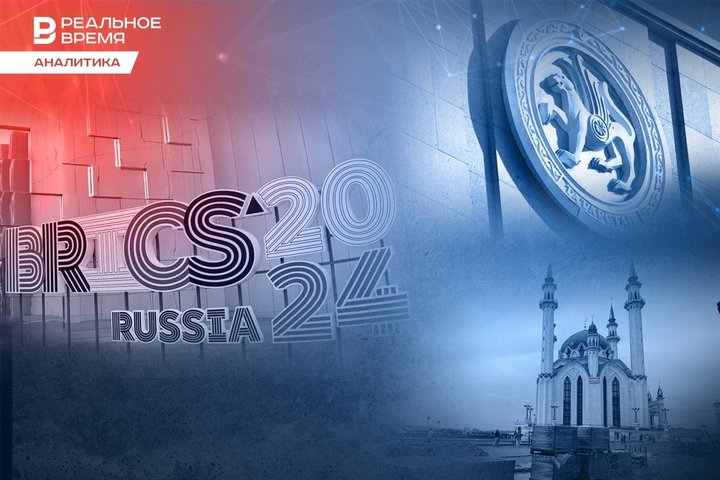BRICS alliance as a counterweight to G7 and IMF
Experts on the role and importance of BRICS ahead of the summit in Kazan

Kazan is waiting for an important international event — the central event of Russia's BRICS presidency — the summit of heads of state on 22-24 October. Realnoe Vremya continues to discuss the significance of this event for the capital of Tatarstan and the region as well as the prospects for further development of cooperation with the BRICS countries with experts. Today we are discussing the upcoming summit with political scientist, president of the Centre for Regional Policy Development Ilya Grashchenkov as well as with economist and Strategic Director at Finam Yaroslav Kabakov.
Today, BRICS is at a crossroads

Today, BRICS, according to the political scientist, is at a crossroads: on the one hand, there is China, which dominates in terms of the scale of its economy, absolutely exceeding all other economies combined. On the other hand, there is Russia, which is trying to dominate the association politically and scientifically, offering various research centres. There are also young economies: Brazil and South Africa trying to “squeeze” some preferences out of BRICS that would help them in the struggle on their continents where the USA, Europe and Western countries dominate today. In addition, there is India with a billion-dollar economy, which stands apart because it is very closely tied to Western countries, primarily Great Britain.
The competition between China, India and Russia at BRICS is quite high, notes Grashchenkov. China would like to expand the association as much as possible and include as many countries as possible in the union, thereby creating an alliance that would be opposed to the countries in G8 and its expanded version. China actually wants to create a union that would oppose the global West. And then in the future, perhaps, on the basis of BRICS, create a military alliance, the expert suggests. And China would dominate in this case. Russia is probably inclined to China's position, since it is also in opposition to the entire Western world. But India would not want this, because the inclusion of a large number of countries dilutes the founders' “share package,” so to speak, he reflects. Brazil and South Africa are also more likely to adhere to India's position: they would like to preserve BRICS in its current state.
As for the name change in connection with the expansion of the union, in principle BRICS has already changed its name. The union was originally called BRIC. Now it has included many countries, and you can’t squeeze everything into one abbreviation, so I don’t think the name BRICS will change. Rather, it will remain the historically established one, says the expert.
Kazan is a major eastern gateway to Russia
BRICS has already been held in Russia, in Yekaterinburg, and then, too, not one of the two capitals was chosen to host the event, recalls Ilya Grashchenkov.
“Firstly, the concept of BRICS is an association of developing countries, so Yekaterinburg and Kazan, which are developing new capitals of their regions and districts, were chosen as the venue for the summit, rather than Moscow and Saint Petersburg,” the political scientist explains. “Secondly, Kazan is a major eastern gateway to Russia, you could even say an eastern harbour. And given that BRICS symbolizes a turn to the East, Kazan is just right for this.”
If we talk about the impact of the summit on the region’s economy, then, of course, to some extent it will have an impact, but it will be insignificant. Holding such large-scale events is connected with the extraction of benefits by the entire country, and not by a specific place that is hosting this summit, notes Grashchenkov.
This will, of course, be a good week precisely for Kazan when many people will come and spend money. In addition, many investors, members of the BRICS delegation, will be able to evaluate Kazan as a potential place for their investments. But in general, the event is political, and one should not count on its economic component directly for the city.
At the same time, the BRICS Summit will allow Tatarstan to expand cooperation with the countries that are part of the union. In many respects with Islamic countries, Tatarstan really represents Russia more organically than any other region. Here, Tatarstan fully feels like a republic within the Russian Federation, on behalf of which one can comfortably negotiate with the United Arab Emirates, Saudi Arabia, the Syrian Republic. In general, with all economically developed countries of the Islamic world that are ready to invest in Russia. Not to mention the possibility of using Islamic banking in Tatarstan or connections at the level of peoples connected culturally and spiritually. Therefore, Tatarstan can really count on new contacts with the BRICS countries and on expanding cooperation.
Peace, new BRICS cryptocurrency and joint circumvention of Western sanctions
“I hope that at the BRICS Summit, decisions can be made regarding a peaceful settlement of the conflict between Russia and Ukraine because China, which, as I have already said, is one of the main BRICS players has already developed a ‘friends of peace’ group, and perhaps at the summit it will want to make some kind of statement that could subsequently entail the earliest possible onset of peace negotiations,” Ilya Grashchenkov suggested.
The second thing that can most likely be adopted is a step towards creating a single BRICS currency, which has been talked about for a long time, and now it is in demand more than ever, especially when monetary policy is changing in the world and new cryptocurrencies are emerging. Perhaps the BRICS countries will be able to seize the initiative here and introduce their own digital currency.
The third expected solution is the issue of bypassing Western sanctions because some BRICS countries are also under them. It is possible that uniting these countries together will help to better combat the overcoming of restrictions, for example, with the substitution of a number of technologies from other large economies. The largest economy today is China, but it is not very willing to share its technologies with others. Perhaps the BRICS countries will raise this issue as well.
BRICS as a counterweight to G7 and IMF

The question of changing the name and concept of BRICS remains open, the economist believes, although the symbolism of this bloc is important. “Even in its expanded form, BRICS continues to strengthen its independence from the West, developing mechanisms for trade in national currencies," he notes.
Kazan, a connecting point for Europe and Asia
“The choice of Kazan for hosting the summit may be due to several factors. Tatarstan is a multi-religious republic, which symbolises the spirit of international cooperation and diversity characteristic of BRICS,” the expert notes. “Kazan is an important economic and cultural centre that promotes international ties, and holding such major events emphasises the status of the region as a connecting point for Europe and Asia.”
“Although the summit is primarily a political event, such events can give an economic boost to the region,” Kabakov believes. “They help attract investment, strengthen ties with new partners and create opportunities for the development of infrastructure and tourism.” Kazan can use its position to strengthen economic cooperation with new BRICS members such as Saudi Arabia and the UAE, especially in energy and technology.
In addition, holding the summit in Kazan creates a platform for expanding trade and investment with BRICS members. “Tatarstan is already actively working within the framework of such ties, and the summit can help increase exports and imports with these countries, especially in the fields of oil, technology and agro-industry,” he lists. “This will also give the republic an opportunity to attract new projects and agreements in such industries as IT and mechanical engineering.”
Following the summit, one can expect to discuss important issues: strengthening trade ties, developing joint infrastructure projects and creating mechanisms to increase mutual trade in national currencies. New steps to reduce dependence on the dollar and strengthen the role of BRICS countries in the global economy are also possible, the expert concludes.